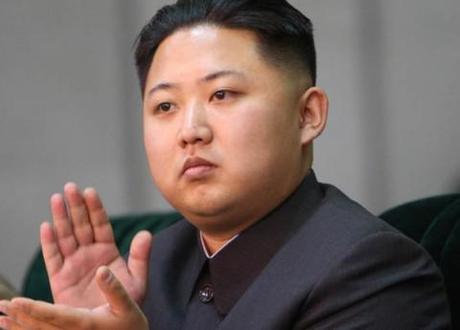
Kim Jong-un, the leader of North Korea.
A rocket launched by North Korea has failed. Such tests were banned by the United Nations; hence the scrutiny. North Korea had also agreed in February to freezing its nuclear activities in return for US food aid – which was then suspended when details of the rocket launch were announced. The country is currently experiencing a transition, as Kim Jong-un, grandson of Kim Il-sung and son of recently deceased leader Kim Jong-il, consolidates his power. North Korea said the launch was that of a satellite, and was part of celebrations to commemorate the 100th birthday of Kim Il-sung, the nation’s founder, but it was thought by many actually to be a test of long-range missile technology,
The BBC reported that the rocket was in the air for only a few minutes before it broke up and crashed into the sea off the Korean peninsula. The LA Times said that foreign journalists who’d been invited in to the country were not however allowed their scoop – they were instead woken up to find that the story had already broken. BBC reporter David Grammaticas was told of it by his own editor.
Lucy Williamson on the BBC said that North Korea had been “surprisingly open about the failure of its satellite” – they even announced the failure on state television. This is a “sharp change from previous launches” (in 1998 and 2009, reported the FT) – which have been announced as “successful”, despite not being so. However, the failure to launch won’t “soften the condemnation” of the rest of the world. Commentators say that the failure of launch, whilst being openly reported – unlike previous failures – will put enormous pressure on Kim Jong-un; further nuclear tests are expected.
“Now in bizarre situation our #NKorea minders asking ME to tell THEM if rocket has launched. Went up 4 hours ago but they have no information,” tweeted David Grammaticas.
What does North Korea say? “The Earth observation satellite failed to enter its preset orbit. Scientists, technicians and experts are now looking into the cause of the failure,” state-run KCNA news agency said, quoted on the BBC .
What about North Koreans? According to CNN, defectors “ told Japan’s Asahi newspaper that the cash spent on the rocket should have gone on food.”
And North Korea’s ally, China? Whilst claiming not to have been told about the launch, a piece in China Daily said that the Japanese were using it as an excuse to contain Beijing, quoted on Asia Times Online.
What’s the local reaction? “The celebrations [for Kim il-Sung] will now be conducted in a subdued mood,” said Cheong Seong-chang, a fellow at Seoul’s Sejong Institute in South Korea, quoted on the Financial Times. Asia Times Online said that the failure was a terrific blow to Kim Jong-un; but it also quoted a Japanese professor, Masao Okonogi, who said North Korea “has acted with arrogance and recklessness more than needed. To recover fallen prestige, it may adopt a more belligerent stance towards other nations.”
What does the West think? “Despite the failure of its attempted missile launch, North Korea’s provocative action threatens regional security, violates international law and contravenes its own recent commitments,” a White House statement said, quoted on the BBC, whilst William Hague, Britain’s foreign secretary, said “”Such a launch uses ballistic missile technology and, as such, is a clear violation of UNSCR 1874. I strongly urge the DPRK to suspend all missile and nuclear-related activity and to commit to re-engaging with the international community,” quoted on UKPA.
So what are the consequences? It puts “huge pressure” on Kim Jong-un, said the Financial Times, who has been positioning himself as a ballistics warrior. But the country can’t afford to be so secretive any more, as its people are learning of things through countries such as China. Unfortunately, though, this launch isn’t the end – satellite imagery shows that a third nuclear test could be on its way – which experts fear might allow North Korea to put a warhead on a long-range missile that could directly threaten the US.

